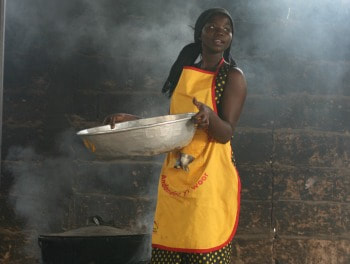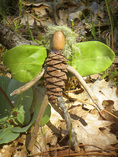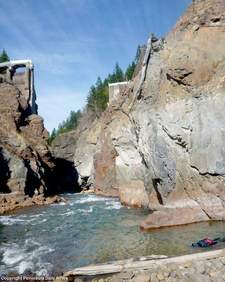|
Starting June 2020, I will start working for Forest Bridges as their Development Consultant & Grant Writer.
The organization's mission is dedicated to "Bringing people together to embrace sustainable forest habitat management solutions for Oregon’s 2 plus million acres of O&C forest lands." Visit https://www.forestbridges.org/ for more information.
0 Comments
 I am so please to joining the amazing team at InStove. InStove implements safe, clean, and highly efficient institutional cookstoves and allied technologies in an integrated approach to serving the world’s poorest communities. InStove technologies are now in service in 23 countries around the world, including 15 countries in Africa. Institutional Stove Solutions—InStove—is a 501(c)(3) non-profit humanitarian organization founded in 2012. We are dedicated to relieving suffering, improving health, and reducing harm to the environment through renewable energy technology and education. Three stone fire and other inefficient cooking methods – used by almost half of the world’s people every day – cause serious problems for human health and the environment:
Saturday, October 14, 2017 8:00 am to 5:30 pmLane Community College Longhouse
4000 E 30th Ave Building 31, Eugene OR 97405 Purpose We believe health care is a right, not a privilege. Access to holistic health providers as well as healthy food is often limited to those who can afford it. Poverty and trauma, including historical trauma, create toxic stress in our bodies that research has shown promotes problematic health conditions. Herbal medicine, acupuncture, energy healing, mindfulness, movement, massage and other body work, should be accessible to everyone, including the poor and traumatized who cannot afford such beneficial pathways to health. The objectives of this conference are to learn mind-body-heart-spirit tools that professionals can integrate into our practices to further the healing of those we serve. Target Audience This one-day conference is designed for healers and health professionals, including MD, DO, ND, DC, RN, LAc, PA, NP, Herbalists, Midwives, Energy Healers, Counselors, Community Health Workers, LMT and body workers, as well as students entering the healing professions. Cost $75 includes lunch. $40/student or low income, with work trades available. For those only wanting to attend the lunch and the panel discussion, cost is $12.00 Lodging As this is a one-day conference, we have arranged no lodging. However, some in our group have Airbnb, or we may be able to help find people willing to host overnight guests. Please contact us for more information. Venue We are honored to be able to use the Lane Community College Longhouse for this event. The parking is excellent on a Saturday, it is the furthest building when entering the main parking lot. LTD bus runs regularly. This is a special place, please respect the following guidelines for its use. Lane Longhouse Code of Conduct
CEU – 8 hours or 8 units of Continuing Education is offered for Health Professions by Lane Community College at no extra fee. Certificate given at the end of conference. Make your entire weekend an herb fest!We specifically scheduled our Decolonizing Natural Medicine conference to coincide with Mountain Rose’s herbalism event to encourage people from out of this area to conveniently attend both. Mountain Rose Free Herbalism Project | Sunday, October 15 from 12-5 pm | Mount Pisgah, Eugene Special event open to all. The Mountain Rose Free Herbalism Project will be held at Mount Pisgah in Eugene not far from the LCC Longhouse. This is an interactive community event with botanically inspired lectures from experts in the field, live music, vendors, and plenty of free organic herbal tea! Conference Schedule7:30 – 8:30 am Registration & Continental Breakfast 8:30 – 9:30 am Movement Therapeutics; The Diagnostic Skills of Tai Chi — Michael Vasquez Practice and discussion around the framework for returning to Natural Intelligence, how traumas are released, and the ways to recognize and work with imbalances. Movement Therapeutics is a primary tool in Mind/Body centering, behavioral changes, cognitive repatterning, and the overall release of cellular constriction. QiGong/Internal Practices give us a foundation to develop and evolve our nature, a self-learning tool that develops our diagnostic sensory intelligence; the ability to feel and interact with an imbalanced area/problem. This naturally develops a deep foundation for working with others. As we choose to face the traumas and imbalances within ourselves, we develop the capacity to work well with others and respect all forms of life. When we consider working with decolonization, we know that we will need to work with others, play well with others, and find and share our common connections. Learning to appreciate different perspectives, being generally flexible and open, harmonizing and shifting in timely manners, and looking for “workable solutions” is what one might refer to as primary evolutionary skills. Michael Vasquez After over 30 years as an executive chef, Michael currently works full time teaching in the arts of Tai Chi, QiGong, Yoga, herbs, diet, and Traditional Chinese Medicine. He is the Director of Transformation Arts which provides educational presentations, online instruction, and instructor training programs to schools, corporate wellness programs, non-profit organizations, and Native programs, as well as community, senior, and child wellness programs. He is the Co-Founder of Red Earth Descendants and is currently the lead in the Golden Garden Elder Lunch Project. 9:30 – 11:00 am Healing Community with Plants — Shelagh Brown What does it mean to decolonize? Recognizing provider privilege, unpacking and providing real tools to provide the most effective and just holistic care should be the cornerstone of our practice. We all live at various intersections of both privilege and marginalization, so learning how to best navigate that will allow us to truly practice in a way where we do no harm. We will also discuss being culturally humble, understanding the population you serve and understanding non-compliance in your clients and how to address it. Using group visit models many integrative practices are using, Shelagh will discuss how she has found giving herb walks is a phenomenal way to bring patients together in community to meet one another and spark and interested in nature and have a more vested interest in their healing. Shelagh Brown, MSc Shelagh holds a BS in Herbal Sciences and a MS in Acupuncture and East Asian Medicine from Bastyr University. She also has completed a yoga teacher training at the Samayra Center for (Human) kindness as well as additional training in Integrated Movement therapy (a yoga based therapy), medical qigong, craniosacral, and aromatherapy. Shelagh approaches all aspects of care through an anti-oppression lens and is deeply dedicated to carrying forward conversations about race, privilege, and institutionalized oppression and how these things affect health as well as access to care. 11:00 – 11:15 am Break 11:15 am – 12:15 pm Creating New Healthy Traditions — Jakob Sletteland Evolving from foraging in the wild to foraging in grocery stores, we have lost knowledge of indigenous foods, understanding heredity diets, food traditions, and lost food security. Diet and lifestyle related ‘diseases of civilization’ such as metabolic syndrome, type 2 diabetes and cardiovascular disease have reached epidemic proportions globally.. This disproportionately affects people of color and the poor, and can only be described as a public health disaster. Informed by traditional medicine and modern research, this session will introduce participants to the etiology and politics of insulin resistance, and provide a no-nonsense natural therapeutic approach. Jakob Sletteland MSc RH(AHG) In addition to a background in ecological defense and social justice activism, Jakob Sletteland is a practicing registered herbalist and clinical nutritionist with ten years of experience in the field. Jakob regularly volunteers his time as a practitioner with Occupy Medical in Eugene, a free integrative medicine clinic, and has organized and run back-country bush clinics at annual indigenous ceremonies in the Pacific Northwest over the last eight years. His private practice, Vital Force Natural Health, is located in Eugene/Springfield. 12:15-1:15pm Lunch Plant Based Buffet Lunch focusing on Indigenous and Locally Grown Organic Foods Tickets for lunch only are available on the registration page for guests who do not want to attend the conference. 1:15 to 2:15 pm Food Grows Community Panel Facilitated by Clare Strawn Modern research indicates what Indigenous peoples have always known: That growing and harvesting food has incredible health benefits, such as soil microbiomes that have antidepressant and antioxidant properties; access to fresh organic non-GMO foods; valuable exercise; and a connection with the earth that is healing to the spirit. This panel will discuss several innovative community garden programs. Clare Strawn, PhD puts her PhD in Urban Studies and Master’s in Education to work using collaborative action that empowers communities. Her perspective is that health and resilience reside with individuals in community. She is the vice chair at Zaniyan Center. PANEL MEMBERS Golden Garden Elder Lunch Project – Michael Vasquez – Reality Kitchen is a nonprofit café and bakery in the River Road area which hosts a weekly free lunch for Elders. The Golden Garden project uses a donated plot and volunteers grow food to support the Elder lunch as well as the local food banks. Volunteers from across the community gather and contribute time and talents to harvest and help prepare food. The convergence of organic food grown within a few miles, together with enthusiastic volunteers and young adults in conversation with elders, has created a lively and growing community worlds away from institutionalized free lunch programs. Eagletree Herbs – Daphne Singingtree – Located in a North Eugene suburban neighborhood on less than ¼ acre, this permaculture urban homestead focuses on growing medicinal herbs, but it also has over 15 different varieties of fruit trees and berries, vegetable gardens, mushrooms, bees, and chickens. Eagletree offers a program for interns to learn to grow and harvest herbs as well as make herbal products. To date Eagletree has trained more than 100 student interns at no cost. Food Gathering Traditions from the Northwest Tribes –– Stephanie Craig The knowledge of gathering and harvesting of plants for food, medicine, baskets, and items for everyday life was in danger of being lost completely with the cultural genocide of the native tribes of the Northwest. Stephanie will share knowledge of plants from her tribal heritage the Confederated Tribes of Grand Ronde, Kalapuya, Umpqua, Takelma Rogue River, Clackamas Chinook and Iroquois. Stephanie Craig, MA is a traditional basket weaver and owner of Kalapuya Weaving. She has a Bachelor of Arts in cultural anthropology with an emphasis on Northwest Native American cultures, an interdisciplinary Masters of Arts degree comprised of coursework in cultural anthropology, cultural museum studies and folklore studies. She is passionate about giving back to the community as part of the next generation of Tradition Bearers, teaching foraging for native foods and medicines. Eugene Avant Gardeners – Plaedo Wellman – A Eugene organization focused on using artistic and innovative approaches towards creating a resilient local food network, that uses permaculture techniques to encourage and inspire people to grow food together. The Avant Gardeners have given away over 10,000 plant starts, hosted over a dozen workshops and over a hundred work parties, given away hundreds of pounds of food, assisted numerous other organizations and have published a series of popular zines. Plaedo Wellman is a philosopher, artist, activist gardener. Check out his TEDx talk “Find your Farmily with Community Gardening” linked from his website plaedo.com. 2:15 – 3:15 pm Herbal Pain Relief; Effective Alternatives to Opiates — Daphne Singingtree A look into the physiology of pain and the herbs and categories of herbs that can be used to treat pain. How herbs can be used for chronic pain management as alternatives to opiates. Daphne Singingtree, MEd, is a Medicine Maker and owner of Eagletree Herbs, a retired midwife, the author of The Birthsong Midwifery Workbook and numerous other midwifery publications. She helped write the Oregon Midwifery Law for Direct Entry Midwives and is a co-founder of the Midwifery Education and Accreditation Council. She is the founder of Zaniyan Center. Her heritage includes Standing Rock Sioux Tribe and she is active in the Water is Life movement. She is in the process of developing an Holistic Community Health Worker Program. 3:15 – 3:30 pm Break 3:30 – 4:30 pm Moving Toward Trauma-Sensitive Healing Arts Practices — Elaine Walters Individual and collective experiences of violence, abuse and other trauma are at the root of many of our most challenging health and social problems. These problems have existed throughout human history, as have efforts to survive and heal from them. Many modern approaches to treating or healing trauma have roots in traditional healing systems that have been in use for thousands of years. At the same time, many practitioners have not been adequately trained on how best to organize their work in ways that are sensitive to the needs of survivors in their care. This presentation will introduce participants to new research on the connections between early life adversity and later life health problems (the ACE Study), and provide an overview on trauma-sensitive practice, including information on preventing and managing vicarious trauma and promoting workplace safety. Elaine Walters is the founding Executive Director and lead trainer at the Trauma Healing Project, an organization that provides professional and community training and direct healing support for survivors. Prior to this position she coordinated the Sexual Assault Nurse Examiner Program for the Attorney General’s Sexual Assault Task Force in Oregon and the Domestic Violence Intervention Project in Lane County working within two large healthcare organizations. For the last 20 years she has been a consultant, trainer and community organizer working to address and eliminate intimate violence. She has designed and facilitated workshops and trainings on many related topics and has provided direct services and support to youth and adults impacted by violence, abuse and other forms of trauma and oppression. She is involved in the effort to expand accessible trauma healing resources and to implement trauma-informed care practices regionally and statewide. 4:30 – 5:30 pm Occupy Medical; Bringing Herbs to the People — Sue Sierralupé A free clinic which evolved from the Occupy street protests, recognizes the role that stress, poverty and lack of access has on health. This clinic provides integrative care to all using conventional medical care, herbs, energy and body work, behavioral health as well as social services. Sue Sierralupé RH, is a Certified Master Herbalist, Master Gardener, professional writer and Sustainable Landscape Specialist. Sue also volunteers as the clinic manager and herb team leader at Occupy Medical clinic. She is the co-author of The Practical Herbalist Herbal Folio series and author of The Pocket Herbal: Medicinal Plants that Changed the World. Follow her blog at HerbalistManifesto.com for commentary on herbs, parenting, nutrition, and a whole lot more or find her on Facebook at Sue Sierralupé. Registration https://www.eventbrite.com/e/decolonizing-natural-medicine-increasing-access-to-holistic-health-for-all-tickets-37571160352?ref=ebtn  FWEC is excited to be collaborating with two amazing southern Oregon organizations starting on October 1st. I actually started my grant writing back in 2002 with the Sugarloaf Community Assocaition, so this feels like a completion of a synchronistic circle! Building and renovation projects will include: driveway, bathroom, classrooms, irrigation system, fencing, permaculture plan, community center, solar power system, pond, and audio/visual systems.  New to FWEC is the Woodlands Charter School in Murphy, OR. The mission of the school is "to kindle a life-long love of learning by providing a developmentally appropriate, arts-integrated curriculum which engages the whole child: head, heart, and hands. Rich academics interwoven with human and nature studies foster a sense of belonging within the human community and a reverence for the beauty of the natural world. Our school will thrive with on-going family involvement and inspire the support of the greater community. Our nurturing learning environment will awaken each child’s thinking, creativity, and emotional sensibility." We will seeking funding for projects similar to the SCA's priorities. Welcome to both organizations!  OLYMPIC NATIONAL PARK — The sight of a chinook resting quietly by the bank of the Upper Elwha River was one that Mel Elofson had awaited for 56 years and worked toward for 20. It was the first sighting of a salmon above the Glines Canyon Dam site in 102 years. “It was awesome,” he said. EDITOR'S NOTE — See related story today, "Raft trip on Elwha River shows its newly untamed nature," http://www.peninsuladailynews.com/article/20140914/NEWS/309149956 The river's once-legendary salmon runs had been blocked by construction of the 108-foot Elwha Dam without fish ladders in 1912, blocking access to spawning grounds. The 210-foot Glines Canyon Dam also was built without fish ladders in 1927. Both of the dams, which once provided electricity for a growing Port Angeles, were demolished in a $325 million project that began in September 2011 as part of the nation's largest river restoration project. Elofson, assistant habitat manager with the Lower Elwha Klallam tribe, saw the chinook, also known as king salmon, while he was conducting a juvenile fish study for the tribe and for the National Oceanic and Atmospheric Administration. It was Sept. 2, a mere week after the last 30 feet of the river's last dam — Glines Canyon — had been blasted out. So he was surprised by what he saw. “I just happened to walk up to the edge of the stream about 100 meters above the dam, and there it was, sitting right next to the bank,” Elofson said. “It was female, probably 20 to 25 pounds. It was in really good shape. “It was exciting,” he said. He notified Olympic National Park officials, and biologists confirmed Elofson's sighting last week. Snorkeling above the dam site, they found three adult chinook, all between 30 and 36 inches long, in the lakebed, said Heidi Hugunin, who explored the water along with her colleague, Anna Geffre, on Tuesday. “She spotted the first one,” Hugunin said. “She jumped out of the water, and she's waving her arms frantically. She starts pointing at the river. “We did some victory dancing.” The biologists began their snorkel survey in Rica Canyon 3 miles above the Glines Canyon dam site, which is some 13 miles from the mouth of the Elwha River, and swam downstream through the former Lake Mills to a point just above Glines Canyon. The salmon were spotted between Windy Arm, a spot halfway down the former lake on the east side of the river, and Glines Canyon. The biologists saw two resting near submerged stumps of ancient trees, while a third was found in a deep pool. “The river has scoured away all the sediment,” Hugunin said. “The banks of the river as it once was is reappearing, and so we are seeing a lot of the pre-dam stumps.” The summer/fall run of chinook began in June and will taper off late this month or in early October. “These are the returning chinook salmon, coming from the ocean,” said Barb Maynes, park spokeswoman. “We've been seeing quite a few below Glines Canyon Dam, but these are the first seen in 102 years above the old dam site. “The chinook are coming back into the river.” In addition to the three chinook, biologists counted 27 bull trout, nearly 400 rainbow trout and two small sculpin during their survey above Glines Canyon. Two weeks ago, park biologists had confirmed that two radio-tagged bull trout had migrated through Glines Canyon and were in Rica Canyon. The three chinook observed last week were not radio-tagged. The following day, biologists counted 432 live chinook in a 1.75-mile section of river just downstream of Glines Canyon but still above the old Elwha Dam site. Biologists hope to do another survey this week, Hugunin said. Now that the river has been freed, Elofson, who grew up playing on the banks of the river and is now 56, said he is elated to see the results. “All they had to do was open the river, and the fish are drawn to it,” he said. The Klallam people, who have lived beside the Elwha River for thousands of years, devoted years to advocating the removal of the dams until Congress passed the Elwha River Restoration Act in 1992. Elofson's first task when he was hired by the tribe in the 1990s was to help map out Lake Mills delta topography in what he said was a pilot project in preparation for taking the dams down. “I worked for the tribe for 20 years or so, and I was waiting for that day to be able see them above both dams,” Elofson said. The sightings of chinook s in the upper river confirm that the dam demolition so long-sought has had its intended result. “It's definitely showing that the salmon are resilient,” Elofson said. “Open it up, and they'll go there. “It'll be great to see them come back in a few years in numbers,” he said. He expects those numbers to match the stories of more than a century ago. “It's going to take awhile, but they will get there,” Elofson said. “There's nothing blocking them.” ________ Managing Editor/News Leah Leach can be reached at 360-417-3531 or at [email protected]. Last modified: September 14. 2014 10:34PM http://www.peninsuladailynews.com/article/20140915/news/309159971/0/SEARCH |
Author: Ahavah OblakMother, Jewish, Nonprofit Advocate, educator, grant writer, curriculum developer, dual US/Israel citizen, friend, dancer, lover of life. Categories
All
Archives
March 2021
|



 RSS Feed
RSS Feed